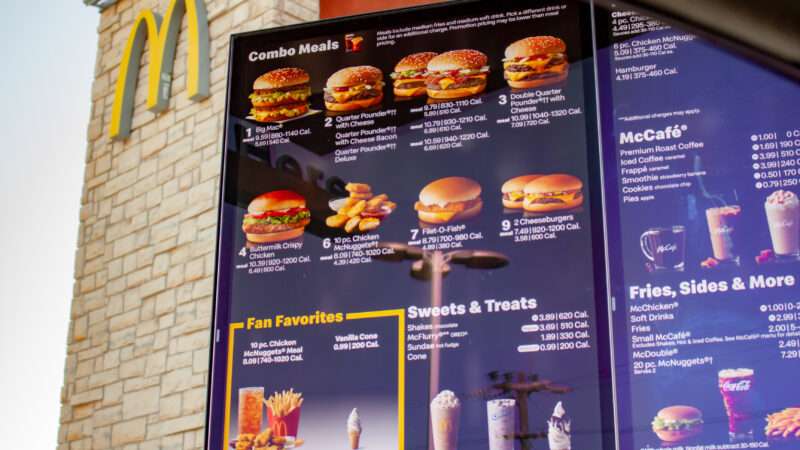
"Calorie labeling on menus hasn't dramatically changed how many calories most people consume when they dine out, research is showing, four years after the Food and Drug Administration began requiring chain restaurants nationwide to post calorie counts," NBC News reported last week. "Meanwhile, obesity rates have risen, from about 30 percent prevalence in 1999-2000 to 42 percent in 2017-2020."
Forcing businesses to add calorie counts to their food menus, supporters contended, was supposed to have a dramatic impact on the food choices Americans make and on our waistlines. As I've explained previously, neither of those things has happened.
The federal menu-labeling mandate, which took effect in 2018 after years of delays, was adopted into law as part of Obamacare. The law, as I've explained, requires owners of chain restaurants, vending machines, groceries, movie theaters, and others to post total average calorie information for most of their menu items.
"The rules would be a disaster," I explained in 2017, noting they would cost $1 billion to implement and that virtually every study published to date indicated menu labeling doesn't improve consumer food choices or health.
Indeed, the NBC reports notes various studies that claim to have found calorie reductions ranging from 25 to 100 calories per person, per meal. If those numbers sound tiny, it's because they are. For example, if a person who dined out 10 times each month—120 times each year—ate 25 fewer calories per meal and their diet remained otherwise unchanged, they'd lose less than one pound per year.
The NBC News report cited the opinions of researchers in the field. They've concluded mandatory menu labeling has made "not much of a difference," promoted "a slight change," or "did not have any impact that we could observe on people's food purchasing behaviors."
Even those tepid assessments of the impact of menu-labeling mandates are actually far rosier than other research has demonstrated overs the years. For example, a 2011 study in the American Journal of Preventive Medicine, where I've served as a peer reviewer, found that one local menu-labeling mandate that preceded (and was preempted by) the national mandate, this one in Seattle, had no impact at all on consumer choices.
"No impact of the regulation on purchasing behavior was found," the study concluded. "Trends in transactions and calories per transaction did not vary between control and intervention locations after the law was enacted."
Subsequent studies have echoed those findings. Others have often focused on finding a silver lining in these failed policies. For example, a 2015 study that looked at the same Seattle menu-labeling mandate focused on increasing consumer "awareness" of calorie counts—a squishy term that has nothing to do with the purpose of the law, to impact choices and obesity rates—which the researchers found occurred mostly among wealthy, white consumers.
"Putting calorie labels on menus really has little or no effect on people's ordering behaviors at all," Julie Downs, lead author of a study published in the American Journal of Public Health, told NBC's own the Today show in 2013.
Historically, supporters of menu-labeling mandates have taken a wait-and-see approach. The Center for Science in the Public Interest, which supported the national mandate, noted as the law took effect in 2018 that "[t]he full impact of menu labeling will be clearer once the national menu labeling policy goes into full effect."
Prof. John Cawley, of Cornell University, who's published studies on menu labeling, told NBC last week that even if mandates are largely ineffective, the upside is that they're "cheap," "easy," and preferred by study participants. I'd counter that they're neither cheap ($1 billion) nor easy (they don't work), and that even if study participants say they love mandatory calorie counts, the facts (the great majority of study participants don't use them) demonstrate otherwise.
In recent years, writers at Bon Appetit, Eater, Tasting Table, and elsewhere have suggested that ineffective menu-labeling mandates might be better off relegated to the scrap heap. That solution is cheap, easy, and reflects what the data truly shows: The full impact of menu labeling is clear; mandatory calorie counts don't work.
The post Mandatory Menu Labeling Still a Flop appeared first on Reason.com.







